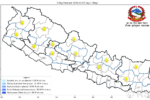KATHMANDU: A study has revealed that not less than 80% of Nepalese youth take debt to go abroad for foreign employment. Foreign Employment Board undertook a study in this regard in as many as 4 provinces of Nepal including districts like Jhapa, Morang, Dhanusha, Siraha, Makwanpur, Sindhupalchok, and Dang only to find that many numbers of the youth fund their foreign trips in search of foreign employment through debt money.
A total of 350 respondents recorded their response in a survey regarding the ‘productive use of remittances’ and as high as 80% of them accepted that they took debt to fund the whole process of foreign employment before flying to foreign destinations for a job. Another study comes at more or less the same conclusion wherein almost 79.9% of youth had taken debt in order to go for foreign employment. Only 9% youth could manage the money from their own home to bear the expenses of entire processing for foreign employment and just 6.3% of them used their own money earned through foreign employment in their previous tenure to apply for foreign jobs once again.
And, as low as 2.4% of the respondents said that they mortgaged their immovable property (such as land and house) or sold the same altogether to manage money for sponsoring their trip to foreign country for gaining employment. Juna Mathema, a surveyor who led this survey cum research study, says that quite a significant number of Nepalese youth toil in the foreign land so that they can send remittances back home for repaying the debt and serving their family by meeting their essential expenditure of daily life. The remittances reaching their home support the education of younger ones and medical need of elders, adds Mathema.
Remittances sent from abroad by Nepalese workforce are spent mainly three headings: Daily house expenditure, medical expenses, and education. The returnees of foreign employment who participated in the survey stressed on gaining employment back in the country instead of forcing them again to move out of Nepal in search of foreign employment. The skills earned in a foreign country get better utilized in our own country — Nepal. The government in this way must guarantee loans at a lower interest rate so that Nepalese youth including the returnees from foreign employment must start their own business here. The demands like mandatory skill training and speedy services from the embassy of Nepal have also been placed in the study. The nature of the job and salary so promised differed from the agreement paper signed in Nepal, says the study.
Reasons for going abroad
As the study reveals, an estimate of 30.1% of those who migrate from Nepal opts for foreign employment to look after their family. Only 8.8% of respondents rated foreign jobs higher than that of Nepal as the main reason for going abroad. A total of 6% went to foreign lands to earn money because their family (primarily wife or husband) wanted them to while others opted for foreign employment because they wanted to live happily hereafter especially in their old age (last part of their life).
More men than women
A research study has revealed that a total of 85.7% of those who go abroad in foreign employment are men and only 14.3% constitutes women in this lot. The research further says that as high as 70% of the total workforce employed in foreign countries belong to the category of youth in their late 20s (26-30 years age group). The said study included the respondents from 5 different religions – Hinduism, Buddhism, Islam, Christianity, and Kirat.
Hindus outnumbered all due to their numerical strength in the country amongst those who applied for foreign employment and grabbed the job there. Most of the respondents belong to the category of manual work with incomplete school education as only 47% of them had a certificate of Grade X and astounding 24.6% of them had discontinued their education after passing Grade VIII. As high as 21.1% of them passed Grade 5 to remain dropouts were toiling in foreign job for earning more than what their own country -Nepal could offer them.
Skills learned before going abroad in foreign employment
The highest numbers of those i.e. 11.9% who were recruited in foreign jobs belong to the hotel industry. They received the short (or even long) training in hotel-related jobs such as cooking, soliciting orders, front desk management and so on before they were recruited by the foreign employers. And 11% of them got the training in house management to maintain the cleanliness, decorum, and others such as sofa, dining table, handling the home appliances and gadgets, offices and gardens. Not less than 10% of them took the early skill training of driving light vehicles or heavy vehicles or both before they applied for the foreign job to work as a driver.
Only 4.4% of them learned carpentry, 4% took training as electricians and 3.8% of them learned the skills of being plumber before they received the offer for foreign employment from foreign countries. Similarly, 4% of the employed workforce in foreign land underwent specific training in skills of masonry to build houses whereas 4% of the workforce employed outside the country learned fundamentals of the construction industry. Only 3% of the workforce desired to become a security guard in a foreign land and got initial training in Nepal and 4.4% of the workforce went abroad to be employed anywhere luck would take them without having any specific training in any field.
Remittances sent from abroad
Research study on the subject matter has shown that most parts of the remittances sent from abroad are spent on daily household needs. Out of the total remittance amount sent by the Nepalese workforce from abroad, less than one-fifth of it — 16.1% is spent on daily household expenses, says the study, 15.5% on medical expenses, 14.6% for repayment of the loan or debt and 13.6% of the remittances go towards funding the education of children.
As low as less than one-tenth — 9% of the total remittances sent by Nepalese workforce are spent on marriages of family members or other rituals such as Bratbandha and all, says the research study report. Just a meager portion 5.7% of the total remittances sent are saved with financial institutions. A study further says that 4.8% of the received remittances are spent to buy modern technology used as hand gadgets or/and home appliances such as TV, refrigerators, mobile, juicers, mixers, rice-cooker, electric oven, and others. Only 3.9% of it goes towards buying land or building houses. Just 1% of the remittances channeled to start a new business or invest in an existing one, says the research study report.
Average of Rs 20,000 per month remittances
On average remittances of Rs 20,000, every month is received by the Nepalese households whose family members are working abroad. A total of 350 respondents participated in the present research study. More than one third 126 i.e. 36% of them said that they send Rs 20,000 – 30,000 home every month. Those who returned from foreign employment to Nepal — 34% of them said that there is no difference now in the capacity to earn between Nepal and foreign land.
Malaysia: Number 1 destination for Nepalese workforce
The research study reveals that Malaysia is the most preferred foreign destination for Nepalese workforce. A survey study conducted on 350 respondents found that 28.5% of them wanted to go to Malaysia in foreign employment. Only, 23.9% chose Qatar as a potential foreign destination to work, 21.3% Saudi Arabia, 10.6% UAE and 5.4% opted for countries like Iraq, Oman, Bahrain, Russia, Lebanon, Israel and India and so on.
92% prefer money-transfer for sending remittances
The research study has revealed that an extremely large percentage of Nepalese workforce prefer money-transfer to send remittances home. Not less than 322 (as high as 92%) out of a total of 350 respondents rooted for money-transfer as the most reliable and easy mode of sending remittances. Not less than 44.9% of the workforce send remittances in name of their spouse (wife or husband as the case may be), 26.3% in name of father, 13.4% send the remittances to mother, 13.4% to siblings (brother or sister) and only 7.1% send the remittances addressed to any other members of their family, the study further elaborates.
How does society look at those who are gainfully employed in a foreign land? At least 71.7% of respondents said that their social status raised in the eyes of people. Similarly, 75.7% of them found foreign employment helpful in getting better medical treatment and 57.4% respondents said that their children are getting a better education than before all due to foreign employment.









Comment